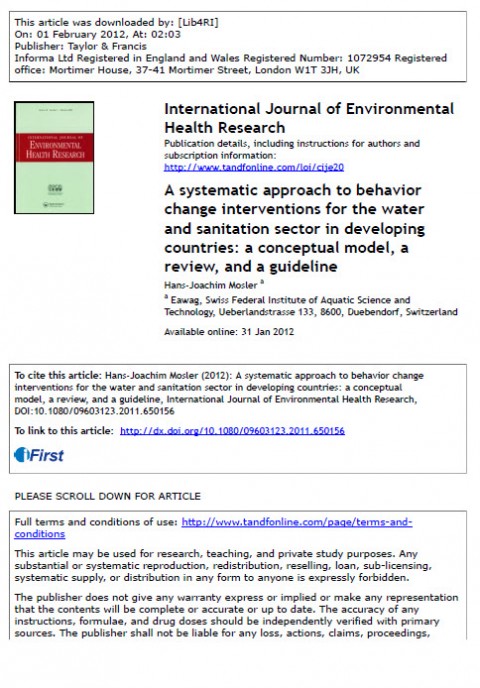A systematic approach to behavior change interventions for the water and sanitation sector in developing countries: a conceptual model, a review, and a guideline
Mosler, H.-J. (2012)

Published in: 2012
Pages: 21
Publisher:
International Journal of Environmental Health Research, 2012, 1–19, DOI:10.1080/09603123.2011.650156
Author:
Mosler, H.-J.
Uploaded by:
SuSanA secretariat
Partner profile:
common upload
5565 Views
38 Downloads
Content - Summary
Public health practitioners increasingly agree that it is not enough to provide people with water and sanitation hardware. Numerous approaches are used to tackle the ‘‘software’’ which means to ensure behavior change necessary to come along with the sanitation hardware. A review of these approaches reveals several shortcomings, most importantly that they do not provide behavioral change interventions which correspond to psychological factors to be changed. This article presents a sound psychological model, which postulates that for the formation of new habitual behavior, five blocks of factors must be positive with regard to the new behavior: risk factors, attitudinal factors, normative factors, ability factors, and self-regulation factors. Standardized tools for measuring the factors in face-to-face interviews are presented, and behavioral interventions are provided for each factor block. A statistical analysis method is presented, which allows the determination of the improvement potential of each factor.
Additional information
Also available here:
www.tandfonline.com/doi/abs/10.1080/09603123.2011.650156
Bibliographic information
Mosler, H.-J. (2012). A systematic approach to behavior change interventions for the water and sanitation sector in developing countries: a conceptual model, a review, and a guideline. International Journal of Environmental Health Research, 2012, 1–19, DOI:10.1080/09603123.2011.650156
Filter tags
English















